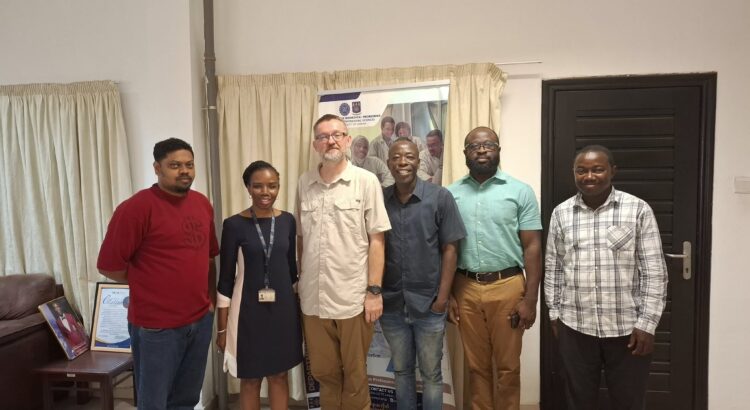As part of the Erasmus program, the Head of the Africa Research Institute, Prof. Dr. János Besenyő, spent a week in Accra, the capital of Ghana, where he visited several facilities of the University of Ghana (Institute of African Studies, College of Humanities, Department of Economics, Department of Biomedical Engineering). The university is considered one of the top universities not only in the region but also on the continent.
During his visit, consultations with university representatives resulted in various prospecting collaborations and joint projects. Professor Besenyő also gave lectures to students, sharing knowledge about Hungary’s role in African peace operations (1989–2025). It was a special honor that Professor Besenyő was invited by Major General Matthew Essien, the Commander of the Ghana Armed Forces Command and Staff College, with whom he discussed joint research opportunities and publication collaborations, particularly within disciplines of security science and security policy. Among other things, General Essien indicated that the Ghanaian Military Academy would join the international security conference organized by the Africa Research Institute and the University of Stellenbosch in South Africa, which this year has been held for the fifth year.
Below is an excerpt from Professor Besenyő’s personal report, which he shared with the public upon his return:
“During my visit at the Headquarters, it turned out that I had served alongside several Ghanaian soldiers in my African peace operations who were also in contact with Major General Matthew Essien and his deputy, Brigadier General Tim Bat. The most famous of them was Lieutenant General Henry Kwami Anyidoho, who was my commander in Sudan during the AMIS (African Union Mission in Sudan) operation in 2005, and with whom I became good friends there. General Anyidoho had previously served as the deputy commander of the UNAMIR (United Nations Assistance Mission for Rwanda) mission during the Rwandan genocide. He personally refused the order to leave the country and masses of vulnerable civilians during the genocide, putting his military career at risk. Thanks to his involvement, more than a thousand Rwandan civilians survived the massacres. In his book Guns over Kigali, he speaks with honesty about the genocide and the UN mission, discussing both its successes and failures.
In recent years, under the Stipendium Hungaricum program, many young Ghanaians have studied in Hungary, while the recently reopened embassy in Accra promotes Hungary through cultural programs. During my visit, I had the opportunity to meet with Professor Ildikó Csajbok-Twerefou, who has been teaching at the University of Ghana for over 16 years and played a key role in establishing cooperation between the university and several Hungarian higher education institutions. I also met with Katalin Torda, who, after emigrating in the 1970s, established one of the largest and most renowned pearl trading businesses in Ghana. Pearls have a significant, millennia-old history in African societies, as they are not only used as decorative elements but also considered valuable assets. By purchasing hundreds of years-old European, African, and Middle Eastern pearls, and due to her tireless and precise work, she has become an internationally recognized expert in the field. I highly recommend visiting her business to anyone traveling to Ghana.”



